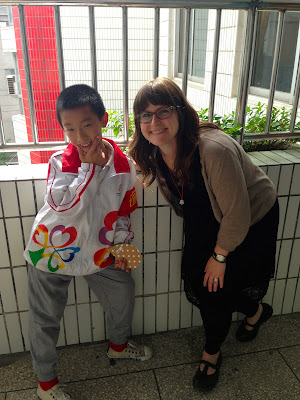After spending three dreamlike days on the Tibetan Plateau, we took a night flight from Shangri-la to Chengdu in Sichuan Province. The moment we stepped off the plane, we noticed several big differences from our sweet days in the high mountains. Warm, heavy wrapped around us and we were surrounded by the busy sights and sounds of a major urban center. The Mr. Panda Hostel helped us arrange an easy transport from the airport. Mr. Panda himself handed us two cold cans of Coca-Cola and invited us to join a dumpling-making party in a couple of days.
In the morning we got up early to join a tour to the Panda Breeding Center and Research Base. Natalie had been looking forward to seeing the pandas since we made plans to travel in China nearly nine months ago. It was not our guide's first trip to see the pandas. He knew just where to go to see the active pandas being their cutest.
We were thrilled to see pandas eating and playing together. The research base works hard to make sure the pandas are content and comfortable in their designed habitats.
Pandas eat consume about 40kg of bamboo per day. After they've had their fill, pandas spend most of the day sleeping, so visitors must arrive early in the day to see the pandas awake and moving around. We were fortunate to visit the panda center on a cool day because the pandas were especially lively.
In the afternoon we visited Wenshu Monastery, a quiet haven within the bustling metropolis of Chengdu. The monastery is still in use and features numerous historic buildings and gardens.
 |
| Pagoda at Wenshu Monastery |
 |
| Wenshu Monastery |
 |
| Gardens at Wenshu Monastery |
A couple streets over from the monastery we found a row of tea shops for which Chengdu is famous. Each shop had many outdoor tables. After a little trial and error, we found a table and ordered two mugs of tea. Green tea is the preferred beverage in China, and there are many different ways to prepare it. The easiest is to put a spoonful of dried leaves in the bottom of a cup and add hot water. You can add hot water as many times as you want until the tea is too weak to taste. We were pleased when our server helped us choose a tea and even brought is a giant thermos of hot water to refill our mugs as we pleased.
Later we found our way to a local restaurant. Chinese restaurants often have customers pay immediately after ordering and before any service has been provided. This approach is a bit abrupt from the Western perspective, but it does avoid the problem of getting the servers attention to pay the bill at the end of the meal when you really want to leave. We are getting used to this, but it still catches us off guard sometimes.
Chengdu has two efficient metro lines that make it quiet easy for locals and tourists alike to navigate the city. Once again Natalie's proficient urban skills came in handy. We had no problem zipping around Chengdu from the monastery to the railway station to People's Park.

















































